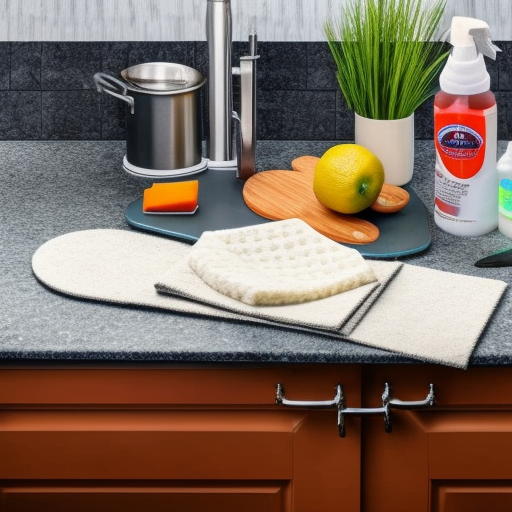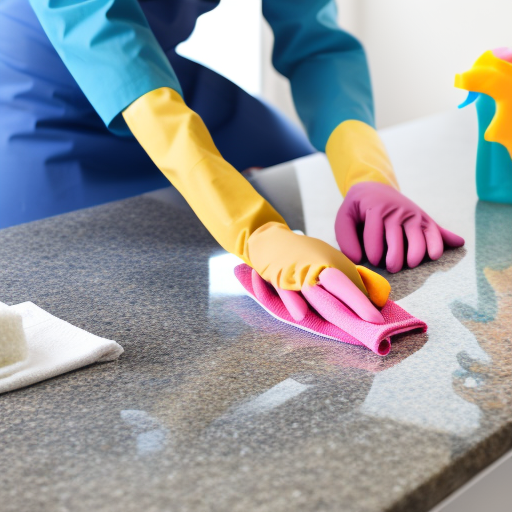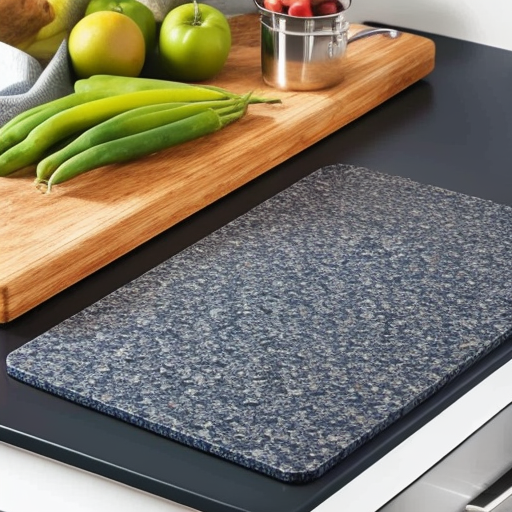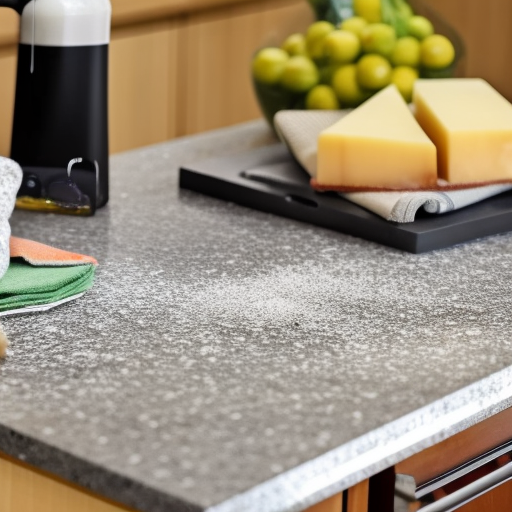Granite countertops are a popular choice for homeowners due to their durability, beauty, and timeless appeal. However, to ensure the longevity of your granite countertop, proper care and maintenance are essential. In this article, we will provide you with expert advice and proven techniques to keep your granite countertop in pristine condition for years to come. From essential tips for maintaining its longevity to the ultimate guide to granite maintenance, we will unlock the secrets of granite care and preservation. Discover the key maintenance practices that will not only extend the lifespan of your granite countertop but also preserve its natural beauty. So, let’s dive into the world of granite care, maintenance, and longevity.
1. “Granite Care 101: Essential Tips for Maintaining Your Countertop’s Longevity”

Granite Care 101: Essential Tips for Maintaining Your Countertop’s Longevity
Granite countertops are not only a beautiful addition to any kitchen or bathroom, but they are also a significant investment. To ensure the longevity of your granite countertop and preserve its natural beauty, it is crucial to follow a proper care and maintenance routine. Here are some essential tips to keep in mind:
1. Regular Cleaning: Daily cleaning is essential for maintaining the longevity of your granite countertop. Use a soft cloth or sponge with warm water and a mild, pH-neutral detergent to wipe away any spills or debris. Avoid using harsh chemicals or abrasive cleaners, as they can damage the sealant and the granite surface.
2. Avoid Acidic or Abrasive Substances: Granite is a durable material, but it is susceptible to etching or staining when exposed to acidic substances like citrus juices, vinegar, or harsh cleaning agents. Additionally, abrasive substances such as steel wool or scouring pads can scratch the surface. Always use cutting boards and trivets to protect the countertop from direct contact with acidic or abrasive materials.
3. Sealant Maintenance: Granite countertops require periodic sealing to maintain their longevity. The sealant acts as a protective barrier, preventing the absorption of liquids and stains. Check the manufacturer’s guidelines to determine the recommended sealing frequency for your specific granite countertop. Typically, it is recommended to reseal your countertop every 1-2 years, but this may vary depending on the color, porosity, and usage of your granite.
4. Wipe Spills Immediately: Promptly wipe up any spills on your granite countertop to prevent them from penetrating the stone and causing stains. Even if your countertop is sealed, it is always best to avoid leaving liquids or food residue on the surface for an extended period.
5. Use Heat Protection: Although granite is heat-resistant, it is still essential to use heat protection measures to prolong its longevity. Avoid placing hot pans or pots directly on the countertop, as extreme heat can cause thermal shock and potentially crack the stone. Always use trivets or hot pads to protect the surface from direct heat.
6. Avoid Excessive Weight: While granite is known for its durability, excessive weight or pressure can cause cracks or damage over time. Avoid standing or sitting on your countertop, and be cautious when placing heavy objects on its surface.
By following these essential tips for granite care and maintenance, you can ensure the long-term beauty and longevity of your countertop. Regular cleaning, avoiding acidic or abrasive substances, maintaining the sealant, promptly wiping spills, using heat protection, and avoiding excessive
2. “The Ultimate Guide to Granite Maintenance: Expert Advice for a Lasting Countertop”

When it comes to granite countertops, proper care and maintenance are essential to ensure their longevity and keep them looking pristine for years to come. To help you in this endeavor, we have compiled the ultimate guide to granite maintenance, featuring expert advice that will help you maintain your countertop’s beauty and durability.
1. Seal Your Granite: One of the most crucial steps in granite maintenance is sealing the countertop. Granite is a porous material, which means it can absorb liquids and stains if left unsealed. To protect your countertop, apply a high-quality granite sealer every one to three years, or as recommended by the manufacturer. Sealing the granite will create a protective barrier, preventing liquids and stains from penetrating the surface.
2. Clean Regularly: Regular cleaning is essential to keep your granite countertop in prime condition. Use a mild, pH-neutral granite cleaner or a mixture of warm water and a few drops of dish soap to clean the surface. Avoid using harsh chemicals, abrasive cleaners, or scrub brushes, as these can damage the sealant and the granite itself. Instead, opt for soft microfiber cloths or non-abrasive sponges to wipe away spills and debris.
3. Wipe Up Spills Immediately: Granite is resistant to stains, but it’s always best to clean up spills as soon as possible. Acidic substances like vinegar, lemon juice, or wine can etch the surface if left for too long. Blot the spill with a clean cloth rather than wiping it, as wiping may spread the liquid and increase the chances of staining.
4. Use Cutting Boards and Trivets: While granite is highly durable, it’s still susceptible to scratches and heat damage. To avoid any potential harm, always use cutting boards when chopping or slicing on the countertop. Additionally, place hot pots, pans, and baking dishes on trivets or heat-resistant pads to prevent thermal shock, which can cause cracks or discoloration.
5. Avoid Heavy Impact: Although granite is known for its strength, it is not indestructible. Avoid dropping heavy objects or slamming pots and pans onto the countertop, as this can chip or crack the surface. Be mindful of any sharp or heavy objects that could potentially damage the granite and take caution when handling them.
By following these expert tips for granite care and maintenance, you can ensure the longevity of your countertop while retaining its natural beauty. Regular cleaning, proper sealing, and cautious use will help you enjoy your granite countertop for many years to come. Remember, investing time and effort in maintaining your granite is well worth it to preserve its longevity and keep it looking stunning in
3. “Unlocking the Secrets of Granite Care: Proven Techniques for Extending its Lifespan”

Granite countertops are a popular choice for homeowners due to their durability, beauty, and timeless appeal. To ensure the longevity of your granite countertop, it is crucial to implement proper care and maintenance techniques. By unlocking the secrets of granite care, you can extend its lifespan and keep it looking as good as new for years to come.
1. Regular Cleaning: The first step in caring for your granite countertop is to establish a routine cleaning schedule. Use a mild, pH-neutral cleaner specifically designed for granite surfaces. Avoid harsh chemicals and abrasive cleaners as they can damage the sealant and cause the stone to lose its shine. Wipe spills immediately to prevent staining and make sure to clean the entire surface regularly to maintain its pristine appearance.
2. Sealing: Granite countertops should be sealed upon installation and resealed periodically to maintain their longevity. The sealant acts as a protective barrier, preventing liquids and stains from penetrating the porous surface of the stone. To determine if your countertop needs resealing, perform a simple water test. Sprinkle a few drops of water on the surface; if it beads up, the sealant is intact. If it absorbs into the stone, it’s time to reseal. Consult with a professional or follow the manufacturer’s instructions to ensure the correct sealant product is used and applied correctly.
3. Preventing Damage: While granite is known for its durability, it is still susceptible to damage if not handled correctly. To avoid scratches and chips, always use cutting boards and trivets when placing hot pots or pans on the countertop. Avoid dragging heavy objects across the surface, as this can also cause damage. Additionally, be cautious with acidic substances such as lemon juice or vinegar, as they can etch the surface. Promptly clean up any spills to prevent staining and avoid using abrasive sponges or scrub brushes that could scratch the surface.
4. Protection from Heat: Granite is naturally heat-resistant, but extreme temperature changes can cause cracking or discoloration. To protect your countertop, use heat-resistant pads or trivets when placing hot cookware directly on the surface. Avoid placing hot items on cold or wet granite, as the sudden change in temperature could lead to thermal shock and damage the stone.
5. Professional Maintenance: Even with proper care, granite countertops may require professional maintenance and restoration over time. It is recommended to have your countertop inspected by a professional every few years to assess its condition and address any issues like cracks, chips, or dullness. Professionals can provide deep cleaning, resealing, and polishing services to restore the granite’s natural beauty and ensure its longevity.
By
4. “Preserving the Beauty of Your Granite Countertop: Key Maintenance Practices for Longevity”

Preserving the Beauty of Your Granite Countertop: Key Maintenance Practices for Longevity
Granite countertops are not only a beautiful addition to any kitchen or bathroom, but they are also a long-lasting investment. To ensure the longevity of your granite countertop and preserve its beauty for years to come, it is crucial to follow proper care and maintenance practices. By incorporating a few simple steps into your routine, you can keep your granite looking as stunning as the day it was installed.
1. Regular Cleaning:
Regular cleaning is essential for maintaining the beauty of your granite countertop. Avoid using harsh chemicals or abrasive cleaners that can potentially damage the stone. Instead, opt for a pH-neutral cleaner specifically formulated for granite. Gently wipe down the surface with a soft cloth or sponge, ensuring all spills and crumbs are removed. Avoid leaving acidic substances such as vinegar or lemon juice on the countertop for prolonged periods, as they can etch the surface.
2. Sealing:
Granite is a porous material, which means it can absorb liquids and stains if left unprotected. To prevent this, it is crucial to seal your granite countertop regularly. The frequency of sealing depends on the type of granite and the sealant used. As a general rule, most granite countertops should be sealed at least once a year. Consult with your installer or a professional to determine the best sealant and schedule for your specific countertop.
3. Avoid Heat and Impact:
Despite its durability, granite can be susceptible to damage caused by extreme heat or impact. To ensure the longevity of your countertop, always use trivets or hot pads when placing hot pots, pans, or appliances directly on the surface. Avoid dropping heavy objects onto the countertop, as this can cause cracks or chips. By taking these precautions, you can protect your granite from potential damage and maintain its pristine condition.
4. Preventative Measures:
In addition to regular cleaning and sealing, there are a few preventative measures you can take to care for your granite countertop. Place coasters or mats under glasses, bottles, or cans to prevent the formation of water rings. Use cutting boards when preparing food to avoid scratching the surface. Avoid using sharp or abrasive tools directly on the countertop. By implementing these practices, you can minimize the risk of damage and ensure the long-lasting beauty of your granite countertop.
By following these key maintenance practices, you can care for your granite countertop and ensure its longevity. Regular cleaning, proper sealing, avoiding heat and impact, and taking preventative measures will help preserve the beauty of your granite for years to come. With a little care and attention, your granite countertop will




